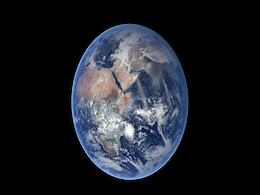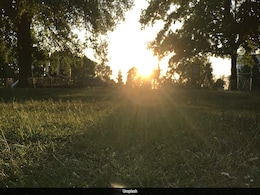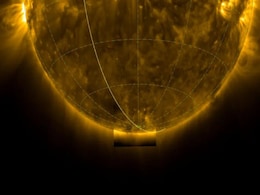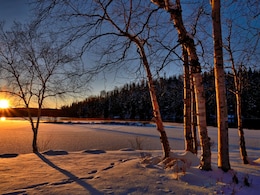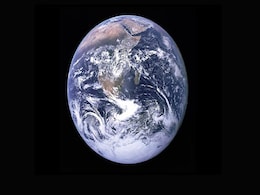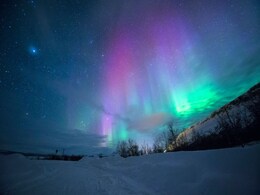Earth Tilted
- All
- News
-

As Polar Night Begins, This City Won't See Sun For Next 64 Days
- Friday November 21, 2025
- World News |
The Polar Night phenomenon, caused by the tilt of the Earth's axis, will leave the town without direct sunlight until January 22, 2026.
-
 www.ndtv.com
www.ndtv.com
-

Astronomers Detect Hints Of Hidden Earth-Sized Planet Beyond Neptune
- Wednesday October 15, 2025
Astronomers propose the existence of ‘Planet Y’, a hidden Earth-size planet that may orbit closer than the theorized ‘Planet Nine’. Based on Kuiper Belt object patterns, the study suggests a rocky world influencing orbital tilts. Experts remain divided, but upcoming sky surveys could soon confirm or rule out its existence.
-
 www.gadgets360.com
www.gadgets360.com
-

Earth’s Spin to Speed Up Briefly, Causing Shorter Days This Summer
- Monday July 14, 2025
Scientists report that Earth will briefly spin faster on July 9, 22, and August 5, shortening those summer days by 1.3 to 1.5 milliseconds. Though undetectable in daily life, this shift offers clues to how lunar gravity and seasonal changes affect planetary dynamics. Experts note that while timekeeping systems like GPS are unaffected, this rare spe...
-
 www.gadgets360.com
www.gadgets360.com
-

Summer Solstice 2025: When Is The Longest Day Of Year & What Does It Mean?
- Friday June 20, 2025
- Offbeat |
Traditionally, the solstice marks the longest day and the start of summer. The event has fascinated civilisations for thousands of years.
-
 www.ndtv.com
www.ndtv.com
-

Solar Orbiter Captures First-Ever Close-Up of Sun’s South Pole, Revealing Magnetic Field Chaos
- Thursday June 12, 2025
In a historic first, ESA’s Solar Orbiter has imaged the Sun’s elusive south pole, exposing a tangle of magnetic fields and solar winds. The mission marks a major leap in understanding space weather and the 11-year solar cycle that influences Earth’s environment.
-
 www.gadgets360.com
www.gadgets360.com
-

NASA introduces Joby Aircraft to Study Wind Effects and Track Aircraft
- Saturday April 19, 2025
The expert team of researchers from NASA has started to study winds and improve aircraft tracking with its experimental aircraft, i.e., Joby. This aircraft will collect essential data and drive improvements in the aviation industry by air collision avoidance and enhanced aircraft tracking, specifically in high-traffic areas.
-
 www.gadgets360.com
www.gadgets360.com
-

James Webb Telescope Captures Neptune’s Auroras in Stunning Detail
- Monday March 31, 2025
The James Webb Space Telescope has provided the first-ever direct images of Neptune’s auroras, revealing surprising details about the ice giant’s atmosphere. Unlike auroras on Earth, Jupiter, or Saturn, Neptune’s auroras appear across unexpected locations due to its tilted and offset magnetic field. Scientists also detected the presence of H...
-
 www.gadgets360.com
www.gadgets360.com
-

Wolf-Rayet 104's Orbit Tilt Reduces Gamma-Ray Burst Threat, Study Finds
- Thursday March 20, 2025
New research using Keck Observatory’s instruments confirms that the orbit of Wolf-Rayet 104 is tilted 30-40 degrees away from Earth, lowering concerns about a possible gamma-ray burst. Previously, it was believed that the system’s alignment could pose a risk. However, spectroscopy data now challenges these assumptions, raising new questions abo...
-
 www.gadgets360.com
www.gadgets360.com
-

Vernal Equinox 2025: Date, Time, and the Science Behind the Event
- Friday March 7, 2025
The vernal equinox 2025 is set for March 20 at 09:01 UTC, marking the astronomical start of spring in the Northern Hemisphere and autumn in the Southern Hemisphere. This event occurs due to Earth’s axial tilt aligning with its orbit, resulting in nearly equal hours of daylight and night across the globe. While the equinox does not bring perfectly...
-
 www.gadgets360.com
www.gadgets360.com
-

Earth's Orbit and Tilt Linked to Ice Age Cycles, Next One Delayed by Climate Change
- Wednesday March 5, 2025
Scientists have discovered a strong link between Earth's tilt and past ice ages, predicting the next glacial period would have started in 11,000 years. However, rising greenhouse gas emissions are disrupting these natural cycles. The research, based on ocean sediment data, supports the theory that Earth's obliquity governs ice expansion while prece...
-
 www.gadgets360.com
www.gadgets360.com
-

Mars Satellite Images Reveal Giant 'Kidney Beans,' Sparking Hints of Water and Life
- Thursday January 16, 2025
NASA's Mars Reconnaissance Orbiter captured images of frozen sand dunes in Mars' northern hemisphere, revealing unique formations halted by carbon dioxide frost during winter. Unlike Earth's desert dunes, which shift with wind, these Martian dunes remain stationary until spring thaw releases their icy grip. Scientists study these features to unders...
-
 www.gadgets360.com
www.gadgets360.com
-

Winter Solstice 2024: All About The Shortest Day And Longest Night Of The Year
- Wednesday December 18, 2024
- Feature |
Winter Solstice 2024: The Earth's tilt of approximately 23.5 degrees on its axis is the primary reason for the occurrence of the winter solstice and the changing seasons.
-
 www.ndtv.com
www.ndtv.com
-

Excessive Groundwater Extraction Causes Earth's Tilt To Shift By 31.5 Inches, Reveals Study
- Monday November 25, 2024
- Science |
Earth's tilt, or axial precession, is influenced by the distribution of mass (in this case water) across the planet.
-
 www.ndtv.com
www.ndtv.com
-

Why Days Get Longer In Summer And Shorter In Winter
- Friday October 4, 2024
- World News | Laura Nicole Driessen, The Conversation
The days are getting longer and in Australia, the switch to daylight saving time is almost upon us (for about 70% of the population, anyway).
-
 www.ndtv.com
www.ndtv.com
-

Aurora Season in September 2024 Could Bring Vibrant Northern Lights Due to Earth's Tilt
- Sunday September 8, 2024
Auroras are expected to be more intense around September's equinox due to the Russell-McPherron Effect. The phenomenon occurs when Earth's magnetic field temporarily aligns with the solar wind, allowing charged particles to penetrate and interact with our atmosphere. This interaction causes vibrant Northern Lights, especially during the equinox. Wi...
-
 www.gadgets360.com
www.gadgets360.com
-

As Polar Night Begins, This City Won't See Sun For Next 64 Days
- Friday November 21, 2025
- World News |
The Polar Night phenomenon, caused by the tilt of the Earth's axis, will leave the town without direct sunlight until January 22, 2026.
-
 www.ndtv.com
www.ndtv.com
-

Astronomers Detect Hints Of Hidden Earth-Sized Planet Beyond Neptune
- Wednesday October 15, 2025
Astronomers propose the existence of ‘Planet Y’, a hidden Earth-size planet that may orbit closer than the theorized ‘Planet Nine’. Based on Kuiper Belt object patterns, the study suggests a rocky world influencing orbital tilts. Experts remain divided, but upcoming sky surveys could soon confirm or rule out its existence.
-
 www.gadgets360.com
www.gadgets360.com
-

Earth’s Spin to Speed Up Briefly, Causing Shorter Days This Summer
- Monday July 14, 2025
Scientists report that Earth will briefly spin faster on July 9, 22, and August 5, shortening those summer days by 1.3 to 1.5 milliseconds. Though undetectable in daily life, this shift offers clues to how lunar gravity and seasonal changes affect planetary dynamics. Experts note that while timekeeping systems like GPS are unaffected, this rare spe...
-
 www.gadgets360.com
www.gadgets360.com
-

Summer Solstice 2025: When Is The Longest Day Of Year & What Does It Mean?
- Friday June 20, 2025
- Offbeat |
Traditionally, the solstice marks the longest day and the start of summer. The event has fascinated civilisations for thousands of years.
-
 www.ndtv.com
www.ndtv.com
-

Solar Orbiter Captures First-Ever Close-Up of Sun’s South Pole, Revealing Magnetic Field Chaos
- Thursday June 12, 2025
In a historic first, ESA’s Solar Orbiter has imaged the Sun’s elusive south pole, exposing a tangle of magnetic fields and solar winds. The mission marks a major leap in understanding space weather and the 11-year solar cycle that influences Earth’s environment.
-
 www.gadgets360.com
www.gadgets360.com
-

NASA introduces Joby Aircraft to Study Wind Effects and Track Aircraft
- Saturday April 19, 2025
The expert team of researchers from NASA has started to study winds and improve aircraft tracking with its experimental aircraft, i.e., Joby. This aircraft will collect essential data and drive improvements in the aviation industry by air collision avoidance and enhanced aircraft tracking, specifically in high-traffic areas.
-
 www.gadgets360.com
www.gadgets360.com
-

James Webb Telescope Captures Neptune’s Auroras in Stunning Detail
- Monday March 31, 2025
The James Webb Space Telescope has provided the first-ever direct images of Neptune’s auroras, revealing surprising details about the ice giant’s atmosphere. Unlike auroras on Earth, Jupiter, or Saturn, Neptune’s auroras appear across unexpected locations due to its tilted and offset magnetic field. Scientists also detected the presence of H...
-
 www.gadgets360.com
www.gadgets360.com
-

Wolf-Rayet 104's Orbit Tilt Reduces Gamma-Ray Burst Threat, Study Finds
- Thursday March 20, 2025
New research using Keck Observatory’s instruments confirms that the orbit of Wolf-Rayet 104 is tilted 30-40 degrees away from Earth, lowering concerns about a possible gamma-ray burst. Previously, it was believed that the system’s alignment could pose a risk. However, spectroscopy data now challenges these assumptions, raising new questions abo...
-
 www.gadgets360.com
www.gadgets360.com
-

Vernal Equinox 2025: Date, Time, and the Science Behind the Event
- Friday March 7, 2025
The vernal equinox 2025 is set for March 20 at 09:01 UTC, marking the astronomical start of spring in the Northern Hemisphere and autumn in the Southern Hemisphere. This event occurs due to Earth’s axial tilt aligning with its orbit, resulting in nearly equal hours of daylight and night across the globe. While the equinox does not bring perfectly...
-
 www.gadgets360.com
www.gadgets360.com
-

Earth's Orbit and Tilt Linked to Ice Age Cycles, Next One Delayed by Climate Change
- Wednesday March 5, 2025
Scientists have discovered a strong link between Earth's tilt and past ice ages, predicting the next glacial period would have started in 11,000 years. However, rising greenhouse gas emissions are disrupting these natural cycles. The research, based on ocean sediment data, supports the theory that Earth's obliquity governs ice expansion while prece...
-
 www.gadgets360.com
www.gadgets360.com
-

Mars Satellite Images Reveal Giant 'Kidney Beans,' Sparking Hints of Water and Life
- Thursday January 16, 2025
NASA's Mars Reconnaissance Orbiter captured images of frozen sand dunes in Mars' northern hemisphere, revealing unique formations halted by carbon dioxide frost during winter. Unlike Earth's desert dunes, which shift with wind, these Martian dunes remain stationary until spring thaw releases their icy grip. Scientists study these features to unders...
-
 www.gadgets360.com
www.gadgets360.com
-

Winter Solstice 2024: All About The Shortest Day And Longest Night Of The Year
- Wednesday December 18, 2024
- Feature |
Winter Solstice 2024: The Earth's tilt of approximately 23.5 degrees on its axis is the primary reason for the occurrence of the winter solstice and the changing seasons.
-
 www.ndtv.com
www.ndtv.com
-

Excessive Groundwater Extraction Causes Earth's Tilt To Shift By 31.5 Inches, Reveals Study
- Monday November 25, 2024
- Science |
Earth's tilt, or axial precession, is influenced by the distribution of mass (in this case water) across the planet.
-
 www.ndtv.com
www.ndtv.com
-

Why Days Get Longer In Summer And Shorter In Winter
- Friday October 4, 2024
- World News | Laura Nicole Driessen, The Conversation
The days are getting longer and in Australia, the switch to daylight saving time is almost upon us (for about 70% of the population, anyway).
-
 www.ndtv.com
www.ndtv.com
-

Aurora Season in September 2024 Could Bring Vibrant Northern Lights Due to Earth's Tilt
- Sunday September 8, 2024
Auroras are expected to be more intense around September's equinox due to the Russell-McPherron Effect. The phenomenon occurs when Earth's magnetic field temporarily aligns with the solar wind, allowing charged particles to penetrate and interact with our atmosphere. This interaction causes vibrant Northern Lights, especially during the equinox. Wi...
-
 www.gadgets360.com
www.gadgets360.com



